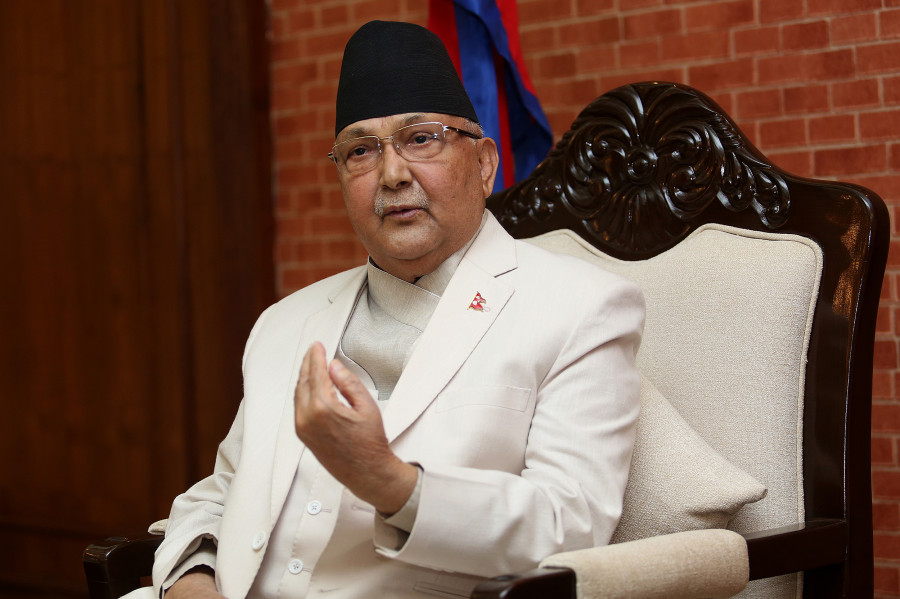National
Despite fiascos and rising Covid-19 cases, the prime minister maintains a stony silence
At a time when world leaders are regularly assuaging the fears of their citizens through regular addresses, Oli last appeared in public on March 20, over two weeks ago.
Tika R Pradhan
The Covid-19 pandemic might have forced entire cities under lockdown and drastically changed peoples’ lives but the government has yet to do things differently, embroiled as it is in a series of controversies. Even while his ministers are getting widely criticised in the press and in public for their alleged involvement in corruption even at a time of crisis, Prime Minister KP Sharma Oli has maintained a stony silence.
The last time Oli appeared before the public was on March 20, in a televised address to the nation. Since then the country has reported nine Covid-19 cases, including one locally transmitted, and his ministers have been accused of corruption.
And yet, Oli has not spoken. Instead, on Friday, President Bidya Devi Bhandari addressed the nation, only to invite criticism from many who said it was the prime minister’s job to allay people’s fears.
Oli is largely avoiding public appearances as he is still recovering from his kidney transplant, but his reluctance to even issue a public message via television or digitally could mean that he lacks the confidence to answer questions, say ruling party insiders.
“The prime minister does not have the answers to recent fiascos,” said Mani Thapa, a Nepal Communist Party (NCP) Standing Committee member. “He’s maintaining silence because he cannot face the questions that are being asked.”
And it is not just the public demanding answers; ruling party leaders themselves have raised questions over the actions of Defence Minister Ishwar Pokhrel and Health Minister Bhanubhakta Dhakal, two of Oli’s closest confidantes in government.
But the ruling communist party has not held any internal meetings for the past two weeks. The last time the party held its Secretariat meeting was on March 18, but no significant issues were discussed in that meeting, except to instruct the government to take appropriate measures to fight the coronavirus.
“I have urged both the chairs to call a meeting before it’s too late,” Narayan Kaji Shrestha, the party spokesperson, told the Post. “But I have not received any information about a meeting yet, and I don’t think it’s going to happen anytime soon.”
National leaders across the world have been at the forefront, communicating regularly with their citizens and trying to assure them of the measures they are taking. In Nepal, observers say, communication from the government has not just been poor but also ominous, given the prime minister’s silence on controversies surrounding his confidantes and a possible outbreak of Covid-19.
“It's very irresponsible of the prime minister to not come out and assure the people in such times,” said Rajendra Maharjan, a political commentator. “As a leader, he cannot avoid the people’s as well as his own party leaders’ questions.”
The silence is very unlike Oli, who has a penchant to comment and make light of issues.
“It is surprising,” said a former member of Oli’s Cabinet. “With so many questions being raised, the party should come to a conclusion to rearrange the government. But both the party and the government aren’t saying anything.”
Those from the Oli camp, however, insist that the prime minister’s silence has nothing to do with a lack of confidence and everything to do with his health.
But Maharjan is not buying that argument.
“Even if he cannot work due to his illness, people have the right to know that,” said Maharjan.
According to Maharjan, the prime minister cannot hold the country hostage and if he is unable to carry out his duties because of his health, he should hand over the responsibility to someone else.
Leaders from the Oli camp also believe that the prime minister is waiting for party Chairman Pushpa Kamal Dahal to make a move, as he suspects Dahal could be orchestrating the government's controversies. It is in Chairman Oli’s nature to comment on various issues so his silence must mean something more, they say.
“Some of Oli’s aides believe that Khumaltar [Dahal’s residence] is behind all these controversies so I think Oli is waiting things out,” said Hemraj Bhandari, a central committee member. “He could be waiting for the next move so that he can make a case that some leaders are trying to create instability.”
But leaders who have close relations with Oli are also uncomfortable with the prime minister’s silence and are of the opinion that he needs to go public, and soon.
“We realise that the prime minister needs to come forward and clarify the controversies,” said Mahesh Basnet, a former minister and central committee member who is an Oli confidante. “We are planning to advise the prime minister to address the concerns of the people as well as party leaders.”




 13.12°C Kathmandu
13.12°C Kathmandu














